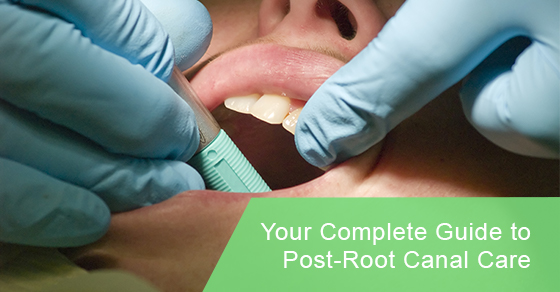Blog

Your Complete Guide to Post-Root Canal Care
Posted by Dr. Julie Boudreault On 26-07-2021
For some reason, the term root canal therapy can cause people to shudder with dread. Unfortunately, root canals are associated with pain, which means when people think of them, they figure the treatment causes the pain. It is actually the opposite. The root canal is the only way to relieve pain when you have a deep cavity, an infected tooth pulp, or, in some cases, an abscessed tooth.
So, although you might be worried you need root canal therapy, you should be relieved to know that it is the best way to save your tooth and avoid complications with infection. That said, once you receive your root canal, you should follow this complete guide for post-root canal care.
Be Prepared to Manage Discomfort
Although we said that a root canal is the treatment to resolve pain, you may still have discomfort such as tenderness and inflammation following the procedure. Make sure you have your trusted over-the-counter pain medication at home, so if you do experience discomfort, you can take it to keep you comfortable.
The good news is that in the case where you do feel pain, it only lasts a day or two for most people. If you do experience ongoing pain beyond the first few days, call our office. For a more Zen approach to pain management, you can also keep yourself busy such as binge-watching your favourite TV show or movies, working, playing games, or reading a good book.
Ask Questions Before You Leave
We take the time to explain the special instructions required for your specific situation before sending you home. Since every case is different, we provide personalized aftercare steps to help you enjoy a speedy, pain-free recovery. However, if you don’t understand something, or think of something specific to your needs, always be sure to ask questions before leaving the dental office following your procedure. As well, once you get home, if you think of anything, remember we are here for you. Just give us a call and we can help.
Reduce Swelling
Some people can experience swelling following a root canal. Be sure to rinse your mouth with a warm water/salt solution to help reduce risk for infection. You can then also apply a cold compress to your face where the swelling occurs. Only apply it for 15-minute intervals. For some people, this can also help speed up recovery.
Eat Softer Foods
It’s always a good idea to go easy on your food choices following a treatment like a root canal. Avoid foods that are too spicy, too hard, or too chewy. For the latter two, it is kind of self-explanatory, as it will be difficult to chew following your treatment. However, you might be surprised you can actually irritate the site by eating spicy food. You don’t want to find out the hard way that this can hurt.
Another important thing to keep in mind is that following initial treatment, you will only have a temporary filling. You really want to eat softer foods to avoid dislodging it. Ideally, for the first few days you can enjoy warm, soft foods like scrambled eggs or soup. You don’t want to eat anything boiling hot or freezing cold, as this will cause irritation and sensitivity as well.
Keep Up the Oral Hygiene
Even if you are experiencing pain, sensitivity, or discomfort, you need to stick to your usual oral hygiene regime. You want to keep the area clean to prevent further infection, while also caring for the rest of your teeth and gums. You might realize that oral hygiene is more important than ever once you experience the symptoms prior to your root canal. Just be gentler around the area where you had the procedure, so you don’t cause irritation or, worse, dislodge the temporary filling.
Book Your Crown Insertion Immediately
No matter how busy you are, be sure to schedule the final placement of your crown as soon as possible. During the procedure, we do the first step, which is drilling into the tooth so we can remove the soft tissue inside. This is the area causing the pain and infection. Once we remove the infected tissue, we thoroughly clean the tooth and then fill the hole with the temporary filling.
You then need a crown to protect the tooth from further infection. While you might worry that a crown must mean you’ve lost the tooth, this is not the case at all. Instead, we have preserved your tooth, and, more importantly, your root, and we use the crown to protect it. The sooner you can get the crown inserted, the less likely it is you can further damage your tooth.
If you would like to learn more about root canal therapy in Milton, call Milltown Dental today at 905-878-8528 or contact us here.

